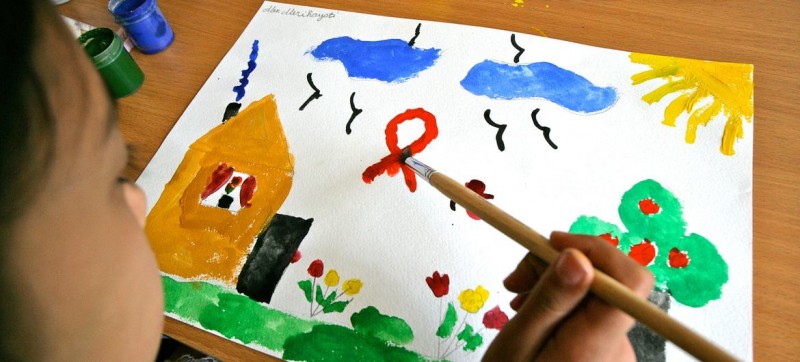A nine-year-old girl, who is HIV-positive, paints at a UNICEF-supported day care centre which provides psychosocial care in Tashkent, Uzbekistan. While more than three quarters of all adults living with HIV are receiving some kind of treatment, the number of children doing so, stands at only 52 per cent. In response to this startling disparity, UN agencies UNAIDS, UNICEF, WHO, and others, have formed a global alliance to prevent new HIV infections and ensure that by 2030 all HIV positive children can get access to lifesaving treatment. The new Global Alliance for Ending AIDS in Children by 2030, made up of UN agencies, civil society groups, governments and international partners, was announced at the landmark International AIDS Conference, which comes to a close in Montréal, Canada, on Tuesday. ‘Healthy, informed generation’ Addressing the conference, Limpho Nteko from Lesotho shared her journey from a surprise HIV diagnosis to pioneering the women-led mothers2mothers programme to combat gestational transmission of HIV. Pregnant when diagnosed, Ms. Nteko highlighted the importance of community leadership in combating HIV: “To succeed, we need a healthy, informed generation of young people who feel free to talk about HIV, and to get the services and support they need to protect themselves and their children from HIV”, she told delegates. “mothers2mothers has achieved virtual elimination of mother-to-child transmission of HIV for our enrolled clients for eight consecutive years – showing what is possible when we let women and communities create solutions tailored to their realities.” Ms. Netko’s emphasis on community leadership will now be backed by the resources of an international coalition. Four pillars for action Together, stakeholders in the alliance have identified four pillars of collective action: The potential success of the alliance rests on its unifying nature. UNAIDS Executive Director Winnie Byanyima argues that, “by bringing together new improved medicines, new political commitment, and the determined activism of communities, we can be the generation who end AIDS in children. We can win this – but we can only win together.” Only through collaboration at all levels of society, can holistic solutions be created to effectively prevent further HIV transmission, said UNAIDS. By localizing solutions, while mobilizing worldwide commitment and resources, the alliance aims to stimulate innovation and hone the technical excellence needed to solve this pressing issue.
The World Organization for Development has been endowed with consultative status with the UN ECOSOC since 2014. The World Organization for Development, which has consultative status wich the UN ECOSOC, develops and implements Global Initiatives to achieve the UN Sustainable Development Goals.




Comments are closed, but trackbacks and pingbacks are open.